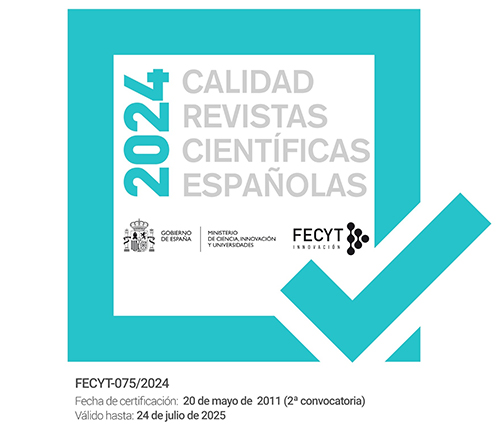How to Build an Epistemic Echo Chamber
DOI:
https://doi.org/10.30827/trif.34113Palabras clave:
cámaras de eco, grupos epistémicos, equilibrios subóptimos, teorema del jurado de CondorcetResumen
El presente artículo ofrece un modelo explicativo de la estructura lógica de las cámaras de eco epistémicas. La mayoría de los trabajos realizados hasta la fecha sobre cámaras de eco atribuyen su causa a vicios epistémicos: surgen debido a un razonamiento deficiente o sesgos cognitivos. Argumento que, en cambio, son un resultado predecible de la formación racional de creencias. Resultan de la agregación y amplificación de las creencias de sus miembros por parte de los grupos, y de la repercusión del consenso grupal en los individuos, quienes aumentan su confianza para integrarse mejor en el grupo. Este proceso es recursivo, impulsando tanto a los individuos como a los grupos epistémicos a una convicción completa. También argumento que no todas las cámaras de eco son malas. Son virtuosas cuando aumentan la credibilidad en la verdad de quienes las componen y las protegen contra las falsedades, los datos corruptos y el razonamiento falaz externo. Las cámaras de eco son malas cuando parten de falsedades y amplifican la confianza en ellas.
Descargas
Citas
Aaronson, Scott (2005), ‘The Complexity of Agreement’, Proceedings of the Thirty-Seventh Annual ACM Symposium on Theory of Computing 634-43. DOI: https://doi.org/10.1145/1060590.1060686
——— (2015), ‘Common Knowledge and Aumann’s Agreement Theorem’, Shtetl-Optimized, https://www.scottaaronson.com/blog/?p=2410.
Asch, Solomon E. (1955), ‘Opinions and Social Pressure’, Scientific American, 193 (5), 31-35. DOI: https://doi.org/10.1038/scientificamerican1155-31
Aumann, Robert J. (1976), ‘Agreeing to Disagree’, The Annals of Statistics, 4 (6), 1236-39. DOI: https://doi.org/10.1214/aos/1176343654
Avnur, Yuval (2020), ‘What’s Wrong With the Online Echo Chamber: A Motivated Reasoning Account’, Journal of Applied Philosophy, 37 (4), 578-93. DOI: https://doi.org/10.1111/japp.12426
Baumgaertner, Bert (2014), ‘Yes, no, maybe so: a veritistic approach to echo chambers using a trichotomous belief model’, Synthese, 191, 2549-69. DOI: https://doi.org/10.1007/s11229-014-0439-9
Begby, Endre (2024), ‘From Belief Polarization to Echo Chambers: A Rationalizing Account’, Episteme, 21 (2), 519-539. DOI: https://doi.org/10.1017/epi.2022.14
Bond, Rod and Peter B. Smith (1996), ‘Culture and Conformity: A Meta-Analysis of Studies Using Asch’s Line Judgment Task’, Psychological Bulletin, 119 (1), 111-37. DOI: https://doi.org/10.1037//0033-2909.119.1.111
Boyd, Kenneth (2019), ‘Epistemically Pernicious Groups and the Groupstrapping Problem’, Social Epistemology, 33 (1), 61-73. DOI: https://doi.org/10.1080/02691728.2018.1551436
Brugnoli, Emanuele, et al. (2019), ‘Recursive Patterns in Online Echo Chambers’, Scientific Reports, 9. DOI: https://doi.org/10.1038/s41598-019-56191-7
Carnap, Rudolf (1959), ‘The Elimination of Metaphysics Through the Logical Analysis of Language’, in Ayer, A. J. (ed.), Logical Positivism (New York: The Free Press).
Carter, J. Adam and Fernando Broncano-Berrocal (2021), The Philosophy of Group Polarization, (London: Routledge). DOI: https://doi.org/10.4324/9781003023654
Christensen, David (2007), ‘Epistemology of Disagreement: The Good News’, Philosophical Review, 116 187-218. DOI: https://doi.org/10.1215/00318108-2006-035
——— (2009), ‘Disagreement as Evidence: The Epistemology of Controversy’, Philosophy Compass, 4/5 756-67. DOI: https://doi.org/10.1111/j.1747-9991.2009.00237.x
Dietrich, Franz and Kai Spiekermann (2020), ‘Jury Theorems’, in Fricker, Miranda, et al. (eds.), The Routledge Handbook of Social Epistemology (New York: Routledge), 386-96. DOI: https://doi.org/10.4324/9781315717937-38
Elzinga, Benjamin (2022), ‘Echo Chambers and Audio Signal Processing’, Episteme, 19 (3), 373-93. DOI: https://doi.org/10.1017/epi.2020.33
Estlund, David (2008), Democratic Authority: A Philosophical Framework, (Princeton: Princeton University Press). DOI: https://doi.org/10.1515/9781400831548
Fantl, Jeremy (2021), ‘Fake News vs. Echo Chambers’, Social Epistemology, 35 (6), 645-59. DOI: https://doi.org/10.1080/02691728.2021.1946201
Flynn, Morris R., et al. (2023), ‘Traffic Modeling— Phantom Traffic Jams and Traveling Jamitons’, https://math.mit.edu/traffic/.
Frances, Bryan and Jonathan Matheson (2019), ‘Disagreement’, in Zalta, Edward N. (ed.), The Stanford Encyclopedia of Philosophy (https://plato.stanford.edu/archives/win2019/entries/disagreement/.
Fujita, Yuki and Kazuo Mori (2017), ‘Group versus Individual Reward in the Asch Experiment without Confederates’, Open Journal of Social Sciences, 5 396-402. DOI: https://doi.org/10.4236/jss.2017.55027
Jackson, Elizabeth G. (2020), ‘The Relationship Between Belief and Credence’, Philosophy Compass, 15 (6), 1-13. DOI: https://doi.org/10.1111/phc3.12668
Jamieson, Kathleen Hall and Joseph N. Cappella (2010), Echo Chamber: Rush Limbaugh and the Conservative Media, (Oxford: Oxford University Press).
Lackey, Jennifer (2021a), ‘Echo Chambers, Fake News, and Social Epistemology’, in Bernecker, Sven, Amy K. Floweree, and Thomas Grundmann (eds.), The Epistemology of Fake News (Oxford: Oxford University Press), 206-27. DOI: https://doi.org/10.1093/oso/9780198863977.003.0010
——— (2021b), The Epistemology of Groups, (Oxford: Oxford University Press).
Licari, Peter R. (2020), ‘Sharp As a Fox: Are foxnews.com Visitors Less Politically Knowledgeable?’, American Politics Research, 48 (6), 792-806. DOI: https://doi.org/10.1177/1532673X20915222
List, Christian and Philip Pettit (2011), Group Agency: The Possibility, Design, and Status of Corporate Agents, (Oxford: Oxford University Press).
List, Christian (2014), ‘When to Defer to Supermajority Testimony—and When Not’, in Lackey, Jennifer (ed.), Essays in Collective Epistemology (Oxford: Oxford University Press), 240-49. DOI: https://doi.org/10.1093/acprof:oso/9780199665792.003.0011
Nguyen, C. Thi (2020), ‘Echo Chambers and Epistemic Bubbles’, Episteme, 17 (2), 141-61. DOI: https://doi.org/10.1017/epi.2018.32
Pettit, Philip (2006), ‘No Testimonial Route to Consensus’, Episteme, 3 (3), 156-65. DOI: https://doi.org/10.3366/epi.2006.3.3.156
Ranalli, Christopher and Finlay Malcolm (2023), ‘What’s So Bad About Echo Chambers?’, Inquiry, forthcoming . DOI: https://doi.org/10.1080/0020174X.2023.2174590
Sunstein, Cass R. (2006), Infotopia: How Many Minds Produce Knowledge, (Oxford: Oxford University Press). DOI: https://doi.org/10.1093/oso/9780195189285.001.0001
Tanis, Martin and Tom Postmes (2005), ‘A Social Identity Approach to Trust: Interpersonal Perception, Group Membership, and Trusting Behavior’, European Journal of Social Psychology, 35 413-24. DOI: https://doi.org/10.1002/ejsp.256
Yudkowsky, Eliezer (2017), Inadequate Equilibria: Where and How Civilizations Get Stuck, (Berkeley, CA: Machine Intelligence Research Institute).
Descargas
Publicado
Cómo citar
Número
Sección
Licencia
Derechos de autor 2025 Steven Hales

Esta obra está bajo una licencia internacional Creative Commons Atribución-NoComercial 4.0.













